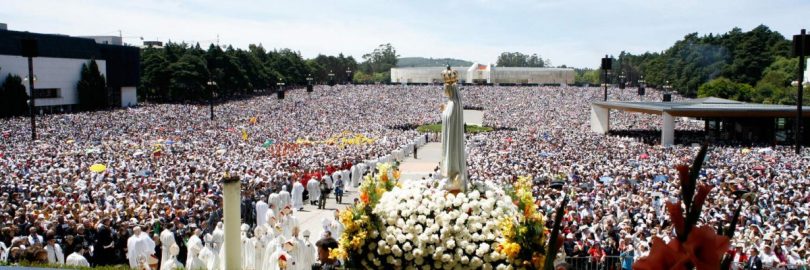Apenas temos que ver fotografias de pessoas a orar em Meca, visitando o Vaticano, lavando-se no Ganges ou participando de um festival religioso no Muro das Lamentações em Jerusalém, para sabermos que tanto a religião como as peregrinações religiosas desempenham um papel importante no turismo. O turismo religioso tem um papel importante mesmo no mundo da “fé secular”, comprovado pelos milhões de pessoas que todos os anos fazem uma “peregrinação” a lugares como Washington DC, ou tratam o seu clube de futebol quase como se fosse um ícone religioso.
As pessoas no mundo do turismo não devem surpreender-se por este fenômeno. Visitas baseadas em fé apelam diretamente para as emoções e o turismo é tudo sobre a “experiência” de estar lá. Embora não gostemos de pensar na religião como algo ligada ao negócio, a realidade é que a religião é um negócio com um grande impacte para a indústria do turismo. Na verdade, há muito que os profissionais do turismo podem aprender com o mundo da religião, perceber como a religião apela à alma dos seus seguidores.
Uma das formas mais antigas de turismo é o turismo religioso. A Bíblia refere que deveriam visitar Jerusalém pelo menos três vezes por ano, por cada uma das festas bíblicas das colheitas. Da mesma forma, o mundo islâmico é famoso para o Hajj, ou peregrinação a Meca, outras cidades ao redor do mundo desenvolveram o turismo religioso. Pessoas de todo o mundo visitam locais como: Fátima, em Portugal e Lourdes na França.
Embora existam muitas diferenças entre a viagem dos fiéis a um local religioso e um parque temático, curiosamente, há também muitas semelhanças entre o que parecem ser dois locais muito diferentes. Por exemplo, na atualidade (pelo que aprendemos com textos antigos), tanto os locais religiosos como os parques temáticos produzem indústrias secundárias, basta visitar Roma ou Jerusalém para ver centenas de pessoas a vender lembranças religiosas. Assim como nos dias da Bíblia, a indústria hoteleira é afetada pelo turismo religioso e, em muitos lugares, a hospedagem cresce em torno de locais de peregrinação. Assim como no mundo do turismo, o turismo religioso é dirigido a um público especifico, neste caso, o crente transforma pela fé o secular no sagrado.
Visitar um local religioso é um exercício de emoção ao invés de cognição. O local pode não ser bonito ou grandioso, mas aos olhos do crente é espiritual e memorável. O turismo religioso ou de fé, não é apenas sobre peregrinações, uma vez que as viagens baseadas na fé podem ter lugar por acontecimentos de vida, por trabalho missionário, por razões de interesse humanitário e / ou como parte de convenções religiosas e conclaves.
O turismo religioso é um grande negócio. Estima-se que apenas nos EUA cerca de 25% das pessoas que viajam interessam-se por turismo religioso. Acresce, ainda, o número extraordinariamente grande de pessoas que viajam para convenções ou atividades baseadas na fé, como: casamentos, bar mitzvahs ou funerais.
A viagem por motivos religiosos é um dos segmentos de mais rápido crescimento em viagens na atualidade. As viagens religiosas têm um valor estimado de US $ 18 bilhões e com 300 milhões de viajantes. Locais de turismo religioso trazem receitas consideráveis.
Para ajudá-lo a lidar com esta tendência crescente de viagens, aqui ficam alguns pontos essenciais para ajudar os viajantes e os profissionais de turismo:
1) – Um estudo recente da Associate Press afirma que Israel é o destino nº 1 na preferência pelos viajantes de fé, seguido de Itália e Inglaterra. O turismo religioso não precisa de ser construído em torno de um local de peregrinação. Não há dúvida de que ajuda ter um grande centro religioso, como Jerusalém, Meca ou Roma, no entanto, a maioria dos locais nunca terá estes espaços sagrados. A ausência de um centro religioso não significa que um local não pode desenvolver o turismo baseado na fé. A Flórida criou a sua própria “terra bíblica” e várias cidades ao redor do mundo encontraram formas de incorporar feriados religiosos no seu produto turístico.
2) – Um local não precisa ter um espaço sagrado importante para fazer parte do turismo religioso. Turismo religioso é tudo o que toca a alma do visitante. Faça uma lista dos seus locais de culto e poderá descobrir que eles contêm não só grandes itens de beleza, como são detentores de histórias pessoais e cultura. Num mundo onde as pessoas procuram genealogias pessoais e uma compreensão de quem são, tanto casas de culto, como cemitérios, podem fornecer uma nova experiência de viagem e fornecer experiências em profundidade.
3) – Dê atenção às condições dos locais religiosos no seu destino. A ênfase na manutenção de um turismo sustentado, com um impacto mínimo nas estruturas antigas e sagradas ou locais de culto, é imperativo. A religião tem um enorme valor sentimental. Os crentes e turistas que têm sede de viagens sagradas certamente adorariam ver o seu destino religioso e lugares de culto bem preservados, com padrões aceitáveis de limpeza e com a existência de infraestrutura de apoio.
4)- Turismo religioso é, muitas vezes, menos propenso a altos e baixos econômicos no mercado. Os viajantes religiosos tendem a ser menos receosos, ou entrar em pânico, durante os períodos de turbulência política. Os viajantes baseados na fé são viajantes comprometidos que tendem a economizar para essas experiências religiosas, apesar do estado da economia ou desafios políticos.
5) – Viajantes de fé têm diferentes motivos para viajar e tendem a ser menos temerosos. Por exemplo, os viajantes de fé viajam frequentemente como parte de uma obrigação religiosa ou para cumprir uma missão espiritual, tendem a ser mais firmes no seu desejo e naquilo que consideram como um compromisso. Portanto, podem fornecer um fluxo constante de rendimento à economia local do turismo.
6) – O mercado de turismo religioso e de fé tem a vantagem de atrair pessoas de todo o mundo, de todas as idades e nacionalidades. A este fato, acresce ainda que muitos dos viajantes de fé gostem de viajar em grupo. O turismo e os profissionais de viagens devem estar cientes de que este mercado pode vir a duplicar até 2020.
7) – Profissionais que trabalham com turismo religioso devem ser sensíveis às necessidades deste mercado, isso significa que os profissionais de turismo devem considerar tudo, desde os tipos de alimentação, até à música. Como em outras formas de turismo, é essencial conhecer o mercado. Por exemplo, as companhias aéreas que não oferecem refeições vegetarianas podem perder uma parte deste tipo de mercado, cuja religião tem restrições alimentares específicas.
8) – Interligar as indústrias secundárias com o turismo baseado na fé. Muitas vezes a espiritualidade que os visitantes procuram é perdida ao nível das indústrias de apoio. É essencial que os hotéis e restaurantes se liguem com as comunidades artísticas e culturais para desenvolver um produto baseado na fé em geral, em vez de ofertas não relacionadas.







